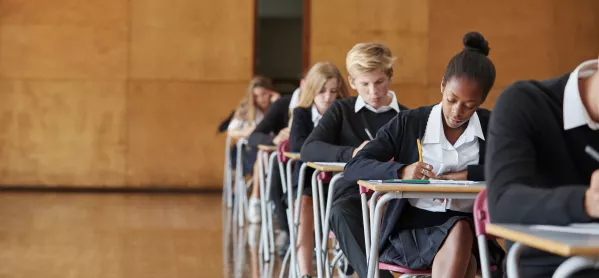2022 exams not ‘fair’, say nearly half of teachers

Nearly half of secondary school teachers believe that measures taken to mitigate the impact of Covid on exams this year did not go far enough, according to survey findings published today.
Measures brought in for this year’s GCSE and A-level students included advance warning on exam topics, as well as formulae and equation sheets.
But, asked whether these measures “will fairly take into account pandemic-related disruption and learning loss”, almost 46 per cent of teachers surveyed disagreed - of whom 12 per cent “strongly” disagreed.
Only 29 per cent agreed with the statement, while 24 per cent neither agreed nor disagreed.
The Teacher Tapp survey, carried out for the Sutton Trust, drew responses from 4,089 secondary school teachers and leaders across the country.
- GCSEs 2022: Ofqual to check impact of exam-aid errors on grades
- A-level results day 2022: Key dates and information
- A levels 2022: AQA investigating chemistry paper “leak”
The research also revealed that disruption from the pandemic was “still ongoing” in schools and had affected absence rates for students applying to university this year.
More than one-fifth (21 per cent) of A-level students missed more than 20 days of school due to Covid-related reasons, equating to four or more weeks of school, the research found.
And over a third (34 per cent) missed 11 or more days, for the same reasons.
GCSEs and A levels 2022: Covid exam measures ‘not enough’
Although the exam mitigations were welcomed when they were first announced last year, some leaders criticised the fact that full information on exam topics was not released until February, while others warned that the alterations would not be enough to combat Covid disruption.
Last month the Sutton Trust also polled 434 UK students who had applied to university this year, of whom 62 per cent said they had “fallen behind” in their studies “compared to where [they] would have been without the disruption of the pandemic”. This figure was 69 per cent last year.
Nearly two-fifths (39 per cent) of students said they thought that the arrangements for exams this year had been “unfair”.
Almost three-quarters (74 per cent) of polled university applicants attending state schools said they were offered at least one kind of catch-up over the past year.
The Sutton Trust report also says that teachers were worried about the disadvantage-related attainment gap widening at their school with the return to national exams, with almost three-quarters (74 per cent) expecting to see this happen.
Just under one in five (19 per cent) thought that the attainment gap at their school would increase “substantially”.
In response to this, the Sutton Trust has recommended that university applicants from disadvantaged backgrounds who have narrowly missed their offer grades “should be given additional consideration in admissions and hiring decisions”.
The report also says that it should be taken into account that those from disadvantaged backgrounds in particular “have faced considerable disruption over the last few years, and that the exam system has not taken into account individual learning loss within the pandemic”.
Dr Mary Bousted, joint general secretary of the NEU teaching union, said that the ”stresses” of the pandemic were “not over for young people”, and that the government “continues to fail them”.
She added that a government that was ”seriously committed to levelling up” would have tried harder to mitigate the effects of Covid on exam preparation.
“As it is, the government’s inadequate programme for educational recovery is compounding the damage done by the pandemic. The full effects of this double failure will be felt in the years ahead,” she said.
A Department for Education spokesperson said that the government had worked with Ofqual to put a number of exam adaptations in place this year “in recognition of the disruption students have faced”.
The spokesperson also said it was “encouraging” that over three quarters of those applying for university found the advanced exam information helpful, as reported by the Sutton Trust.
“To help students get back on track we have invested nearly £5bn, with over two million tutoring courses already started through the National Tutoring Programme, across an estimated 80 per cent of schools.”
You need a Tes subscription to read this article
Subscribe now to read this article and get other subscriber-only content:
- Unlimited access to all Tes magazine content
- Exclusive subscriber-only stories
- Award-winning email newsletters
Already a subscriber? Log in
You need a subscription to read this article
Subscribe now to read this article and get other subscriber-only content, including:
- Unlimited access to all Tes magazine content
- Exclusive subscriber-only stories
- Award-winning email newsletters
topics in this article



